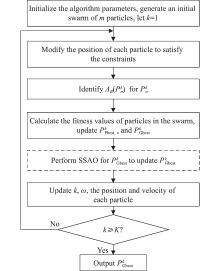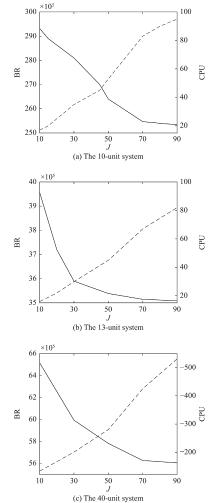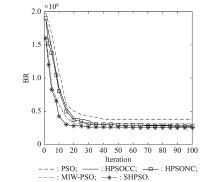| 1 |
HUANG Q, JIA Q S, GUAN X A multi-timescale and bilevel coordination approach for matching uncertain wind supply with EV charging demand. IEEE Trans. on Automation Science & Engineering, 2017, 14 (2): 694- 704.
|
| 2 |
LI P, YANG M, WU Q W Confidence interval based distributionally robust real-time economic dispatch approach considering wind power accommodation risk. IEEE Trans. on Sustainable Energy, 2021, 12 (1): 59- 69.
|
| 3 |
HUANG C M, KUO C J, HUANG Y C Short-term wind power forecasting and uncertainty analysis using a hybrid intelligent method. IET Renewable Power Generation, 2017, 11 (5): 678- 687.
|
| 4 |
TAN Z F, HE Y X On units combination and commitment optimization for electric power production. Journal of Systems Engineering and Electronics, 2004, 5 (1): 12- 18.
|
| 5 |
SHI Y H, DONG S F, GUO C X, et al Enhancing the flexibility of storage integrated power system by multi-stage robust dispatch. IEEE Trans. on Power Systems, 2020, 36 (3): 2314- 2322.
|
| 6 |
FILABADI M D, AZAD S P Robust optimisation framework for SCED problem in mixed AC-HVDC power systems with wind uncertainty. IET Renewable Power Generation, 2020, 14 (14): 2563- 2572.
doi: 10.1049/iet-rpg.2019.1127
|
| 7 |
YUAN H L, XU Y Preventive-corrective coordinated transient stability dispatch of power systems with uncertain wind power. IEEE Trans. on Power Systems, 2020, 35 (5): 3616- 3626.
doi: 10.1109/TPWRS.2020.2972003
|
| 8 |
XU Q S, DENG C H, ZHAO W X, et al A multi-scenario robust dispatch method for power grid integrated with wind farms. Power System Technology, 2014, 38 (3): 653- 661.
|
| 9 |
HUANG Q, JIA Q S, GUAN X Robust scheduling of EV charging load with uncertain wind power integration. IEEE Trans. on Smart Grid, 2018, 9 (2): 1043- 1054.
|
| 10 |
ZHANG Y P, AI X M, WEN J Y, et al Data-adaptive robust optimization method for the economic dispatch of active distribution networks. IEEE Trans. on Smart Grid, 2019, 10 (4): 3791- 3800.
|
| 11 |
FANG D W, GUAN X, HU B R, et al Deep reinforcement learning for scenario-based robust economic dispatch strategy in Internet of Energy. IEEE Internet of Things Journal, 2021, 8 (12): 9654- 9663.
doi: 10.1109/JIOT.2020.3040294
|
| 12 |
WU W C, CHEN J H, ZHANG B M, et al A robust wind power optimization method for look-ahead power dispatch. IEEE Trans. on Sustainable Energy, 2014, 5 (2): 507- 515.
|
| 13 |
WANG B, YANG X F, LI Q Y Bad-scenario based robust scheduling model. Acta Automatica Sinica, 2012, 38 (2): 270- 278.
doi: 10.3724/SP.J.1004.2012.00270
|
| 14 |
WANG B, WANG X Z, XIE H X Bad-scenario-set robust scheduling for a job shop to hedge against processing time uncertainty. International Journal of Production Research, 2019, 57 (10): 3168- 3185.
|
| 15 |
WANG B, XIE H X, XIA X D , et al A NSGA-II algorithm hybridizing local simulated-annealing operators for a bi-criteria robust job-shop scheduling problem under scenarios. IEEE Trans. on Fuzzy System, 2019, 27 (5): 1075- 1084.
|
| 16 |
WANG X Z, WANG B, ZHANG X, et al Two-objective robust job-shop scheduling with two problem-specific neighborhood structures. Swarm and Evolutionary Computation, 2021, 61, 100805.
doi: 10.1016/j.swevo.2020.100805
|
| 17 |
FARHAT I, EL-HAWARY M E Dynamic adaptive bacterial foraging algorithm for optimum economic dispatch with valve-point effects and wind power. IET Generation Transmission & Distribution, 2010, 4 (9): 989- 999.
|
| 18 |
CHIANG C L Improved genetic algorithm for power economic dispatch of units with valve-point effects and multiple fuels. IEEE Trans. on Power Systems, 2005, 20 (4): 1690- 1699.
|
| 19 |
PARK J B, JEONG Y W, SHIN J R, et al An improved particle swarm optimization for nonconvex economic dispatch problems. IEEE Trans. on Power Systems, 2010, 25 (1): 156- 166.
|
| 20 |
ELSAYED W, HEGAZY Y, EL-BAGES M, et al Improved random drift particle swarm optimization with self-adaptive mechanism for solving the power economic dispatch problem. IEEE Trans. on Industrial Informatics, 2017, 13 (3): 1017- 1026.
|
| 21 |
WU J K, XIONG Y Establishment and solution of the complementary power generation model of wind-energy, hydro-energy and natural gas. Power System Technology, 2014, 38 (3): 603- 609.
|
| 22 |
LU Z G, ZHAO H, XIAO H F, et al Robust DED based on bad scenario set considering wind, EV and battery switching station. IET Generation Transmission & Distribution, 2017, 11 (2): 354- 362.
|
| 23 |
LEE C Y, TUEGEH M Optimal optimisation-based microgrid scheduling considering impacts of unexpected forecast errors due to the uncertainty of renewable generation and loads fluctuation. IET Renewable Power Generation, 2020, 14 (2): 321- 331.
doi: 10.1049/iet-rpg.2019.0635
|
| 24 |
BASU M Modified particle swarm optimization for nonconvex economic dispatch problems. International Journal of Electrical Power & Energy Systems, 2015, 69, 304- 312.
|
| 25 |
CHEN H H, ZHANG R F, LI G Q, et al Economic dispatch of wind integrated power systems with energy storage considering composite operating costs. IET Generation Transmission & Distribution, 2016, 10 (5): 1294- 1303.
|
| 26 |
SHI L B, YAO L Z, WANG R Modeling and solutions of coordinated economic dispatch with wind-hydro-thermal complex power source structure. IET Renewable Power Generation, 2017, 11 (3): 262- 270.
|
| 27 |
LI Z, QIN J L, TAN W, et al Optimizing schedule for electric power system of energy-saving and emission-reducing based upon objective-weight oriented multi-objective particle swarm optimization. Proceedings of the CSEE, 2015, 35 (S1): 67- 74.
|
| 28 |
HE D K, DONG G, WANG F L, et al Optimization of dynamic economic dispatch with valve-point effect using chaotic sequence based differential evolution algorithms. Energy Conversion & Management, 2011, 52 (2): 1026- 1032.
|
| 29 |
YUAN T J, CHAO Q, TOERXUN Y, et al Optimized economic and environment-friendly dispatching modeling for large-scale wind power integration. Proceedings of the CSEE Society for Electrical Engineering, 2010, 30 (31): 7- 13.
|
| 30 |
XU Q S, YANG Y, LIU Y J, et al An improved latin hypercube sampling method to enhance numerical stability considering the correlation of input variables. IEEE Access, 2017, 5, 15197- 15205.
|
 ), Pengfei ZHANG(
), Pengfei ZHANG( ), Yufeng HE(
), Yufeng HE( ), Xiaozhi WANG(
), Xiaozhi WANG( ), Xianxia ZHANG
), Xianxia ZHANG







